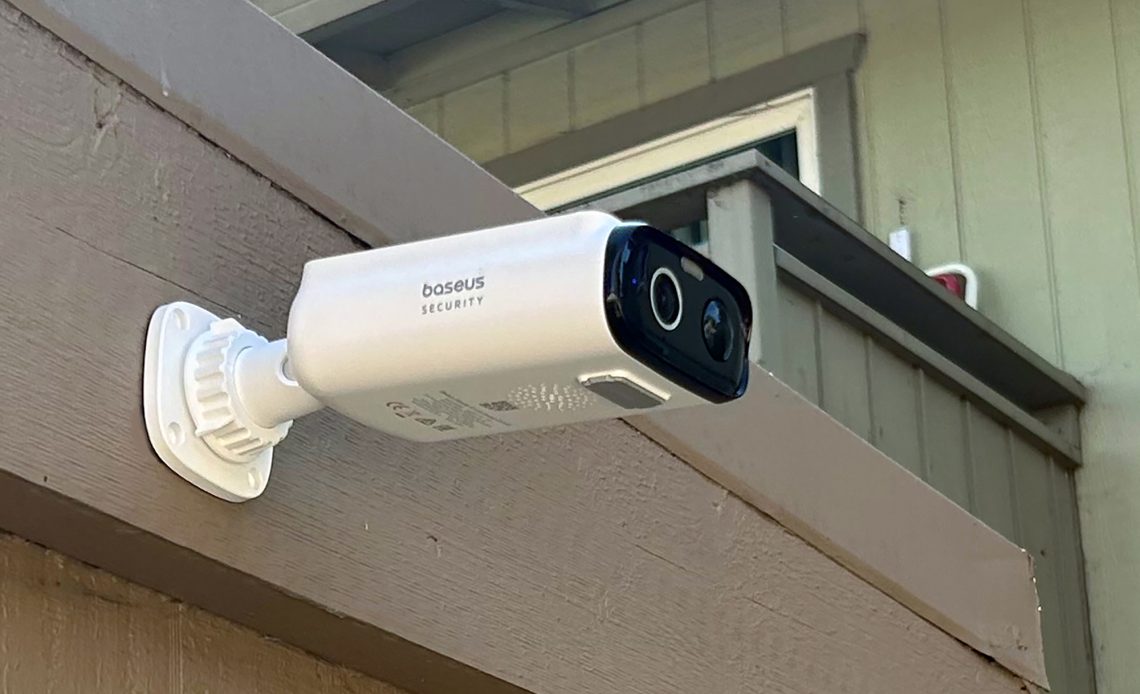
Baseus has been steadily pushing beyond its roots in phone chargers and accessories, and its latest move is to expand it’s smart security lineup with two solar-powered outdoor cameras: the Baseus S1 Lite (reviewed here) and the Baseus S2 (which we’ll cover at a later date).
The company pitches the Basues S1 Lite as a budget-friendly option designed for people who want affordable security without being tied to monthly fees for cloud storage. The question is whether the camera feels like a genuine bargain or just a bunch of trade-offs.
Unlike the conventional bullet- and dome-style cameras you see on most houses, the S1 Lite has a flat, rectangular shape. The design allows its solar panel to be integrated into the camera body rather than bolted on as a separate unit. That small detail gives the S1 Lite a sleeker, more modern look than many other solar-powered cameras.
The solar panel is paired with a 5,200mAh battery. A couple of hours of sunlight a day is enough to keep it topped off, according to Baseus, with a single charge lasting up to 150 days. It’s weatherized to handle the outdoors, with an IP67 rating for dust and water resistance, and is built to operate in temperatures from –4 degrees Fahrenheit to 122 F. (Allow us to explain what you need to know about IP codes.)
The camera records in 2K resolution and has a 135-degree field of view, that’s wide enough to cover a good chunk of a yard or driveway. An 8x digital zoom lets you get a closer look at people or objects within about 26 feet. At night, a built-in spotlight kicks on to deliver color video when motion is detected, effective out to about 20 feet.
The S1 Lite isn’t overloaded with AI features, but it covers the basics: It can distinguish between human movement and general motion, and you can draw up to two custom activity zones while masking out two privacy zones. Two-way audio lets you hear what’s happening outside and speak with visitors and delivery people. For storage, you can slot in a microSD card with a capacity up to 512GB (our guide to microSD cards will help you pick one). This means your recordings are stored locally, with AES and RSA encryption, and free from subscription fees.
For smart-home users, the S1 Lite ties into the Amazon Alexa and Google Assistant ecosystems and is managed through the Baseus app for Android or iOS.
Setting up the S1 Lite starts with downloading the Baseus Security app, which you’ll need to connect the camera to your Wi-Fi network. Once the camera is powered on, the app automatically detects it and walks you through the connection process step by step. From there, you can mount the camera with the included screw mount, a job that takes only a few minutes thanks to its wireless design. Connectivity is limited to 2.4GHz Wi-Fi networks, which is common at this price but worth noting if your network is already overcrowded.
Video performance is solid for a budget camera. The 2K resolution captures good detail during the day, and the wide-angle view means you can cover a yard or driveway with a single unit. At night, black-and-white infrared night vision keeps watch until motion triggers the spotlight, enabling the camera to deliver color video that can capture details like the color of clothing or car paint.
The Baseus Security app functions well as a control hub for the camera. The home screen shows a live feed with quick access to functions like recording, snapshots, spotlight, and two-way talk. Dive into settings and you can adjust video and audio quality, manage battery performance, or fine-tune motion detection. Sensitivity is controlled with a simple slider, and you can choose between detecting all motion or just human activity. It’s a straightforward, no-nonsense layout that makes it easy to get the camera working the way you want without feeling buried in menus.
Smart alerts were generally responsive in my testing. Setting the detection to “human” cut down on the number of notifications from trees swaying and other incidental motion, effectively keeping notifications manageable.
I’ve always been a fan of local storage, as it keeps my data in my hands and eliminates ongoing fees for cloud storage. But it’s worth noting that Baseus doesn’t provide any means for backing up the camera’s video recordings offsite. So, if the camera is damaged or stolen in the commission of a crime, you’ll have no forensic evidence. That trade-off will matter more to some than others, but at this price point it feels like a fair compromise.
The Baseus S1 Lite makes a strong case as an entry-level outdoor camera. At $80–and selling for much less online–it’s cheaper than many 2K solar-powered competitors, and the absence of a subscription fee to store its video recordings in the cloud lowers its total cost of ownership even more.
You will need to make some small compromises, however. Support for only 2.4GHz Wi-Fi will limit its performance on crowded networks. The two-activity-zone/two-privacy-zone limit might prove restrictive if you’re monitoring a larger space. And advanced AI smarts like vehicle or pet detection will be missed if you want to watch out for unfamiliar cars or wandering critters. If those things matter, either keep shopping.
For budget-conscious homeowners, though, the Baseus S1 Lite hits the right notes. You’ll give up some bells and whistles, but you’ll still get a capable solar-powered camera that delivers on its core promise: affordable outdoor security.
Author: Michael Ansaldo
Source: PCWorld
Reviewed By: Editorial Team



